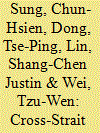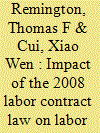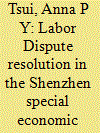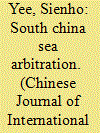|
|
|
Sort Order |
|
|
|
Items / Page
|
|
|
|
|
|
|
| Srl | Item |
| 1 |
ID:
110206


|
|
|
|
|
| Publication |
2012.
|
| Summary/Abstract |
This article presents the case for arbitrating the territorial dispute over the West Bank between Israel and the Palestinian Authority. After nearly two decades of intense intermediary activity but with still no signs of progress, and against the inability of the parties themselves to move towards reconciliation, the article argues that as a method of conflict resolution, mediation has exhausted its primary objective - namely the establishing of direct channels of communication between the disputants - and it is now time to examine alternative methods to conflict resolution. The article debunks the myths surrounding the success of American mediation in the conflict, and uses the historical case of the Taba arbitration between Israel and Egypt to demonstrate under what terms the arbitration of the West Bank dispute might be presented, while taking into consideration its advantages and drawbacks compared with the more established method of mediation in this conflict.
|
|
|
|
|
|
|
|
|
|
|
|
|
|
|
|
| 2 |
ID:
156863


|
|
|
| 3 |
ID:
148500


|
|
|
|
|
| Summary/Abstract |
John Mearsheimer has compared China’s attitude towards the South China Sea to the Monroe Doctrine of the United States. Mearsheimer does not accord international law much weight and certainly does not regard it as determinative of political outcomes. But many observers of China’s disputes in the South China Sea look to international law for rules and processes that could facilitate peaceful resolution of the disputes. In doing so they are variously puzzled, bemused, and/or angered by China’s assertion of the nine-dash line (南海九段线). This article draws more broadly on the literature on the Monroe Doctrine, viewing the doctrine as: a unilateral pronouncement of foreign policy; representing resistance; embedded in domestic as opposed to international law; and an assertion of legitimate regional hegemony. Through applying the analogy of the Monroe Doctrine, the article seeks fresh insights into China’s legal position in relation to the South China Sea and into the significance of the nine-dash line in terms of international law.
|
|
|
|
|
|
|
|
|
|
|
|
|
|
|
|
| 4 |
ID:
045980


|
|
|
|
|
| Publication |
London, Continuum, 2003.
|
| Description |
xviii, 373p.
|
| Standard Number |
0826457479
|
|
|
|
|
|
|
|
|
|
|
|
Copies: C:1/I:0,R:0,Q:0
Circulation
| Accession# | Call# | Current Location | Status | Policy | Location |
| 046984 | 303.6/CHE 046984 | Main | On Shelf | General | |
|
|
|
|
| 5 |
ID:
107321


|
|
|
|
|
| Publication |
2011.
|
| Summary/Abstract |
The third round of talks between Chiang Pin-kung (???) chairman of Taiwan's Straits Exchange Foundation, and Chen Yunlin (???), president of China's Association for Relations Across the Taiwan Strait, established an institutionalized platform for legal cooperation by concluding the Agreement on Joint Cross-Strait Crime-fighting and Mutual Judicial Assistance (hereafter, the Cross-Strait Judicial Agreement). This study will focus on Article 10 of the Cross-Strait Judicial Agreement, which contains the only reference in international law to Taiwan's and China's responsibility to recognize arbitration awards. This article will examine international rules for recognizing judgments and will make reference to other similar agreements in China that provide models for a future agreement with Taiwan. It is concluded that the form of Article 10 of the Cross-Strait Judicial Agreement can only be regarded as a first step toward judicial cooperation. A further and detailed bilateral agreement would provide safeguards for this preferential treatment. The need to avoid controversy cannot be used as an excuse for ignoring certain important matters.
|
|
|
|
|
|
|
|
|
|
|
|
|
|
|
|
| 6 |
ID:
107967


|
|
|
|
|
| Publication |
2011.
|
| Summary/Abstract |
International relations scholars have garnered a good deal of evidence indicating that binding arbitration and adjudication are highly effective means for brokering agreements and ending conflict. However, binding third-party conflict management is rarely pursued to resolve interstate disputes over contentious issues like territorial or maritime control. While states value the effectiveness of binding procedures, they are reluctant to give up the decision control necessary to submit to arbitration or adjudication. The authors identify three factors that influence the willingness of states to give up decision control: issue salience, availability of outside options, and history of negotiations. An analysis of attempts to settle territorial, maritime, and river claims reveals that disputants are less likely to use binding conflict management when they have a greater need to maintain decision control.
|
|
|
|
|
|
|
|
|
|
|
|
|
|
|
|
| 7 |
ID:
156860


|
|
|
| 8 |
ID:
140288


|
|
|
|
|
| Summary/Abstract |
China's Labor Contract Law came into force on January 1, 2008. One of several important legislative acts aimed at improving the processing of labor grievances through mediation, arbitration, and litigation, and averting collective labor protest, it provides that all employed persons must work under written individual employment contracts. We evaluate the legislation's impact nationally and by province for the years before and after the law's adoption. Observing that the law's effect varied substantially across provinces, we estimate the effects of the law, controlling for time, development level, export intensity, and migrant labor share, on the volume of disputes by province using a cross-sectional time series design. We also examine the law's impact on the incidence of collective disputes and the grounds for disputes. We find that the law significantly increased the volume of labor disputes, raising questions about the relative costliness of the government's strategy for managing employment relations.
|
|
|
|
|
|
|
|
|
|
|
|
|
|
|
|
| 9 |
ID:
090117


|
|
|
|
|
| Publication |
2009.
|
| Summary/Abstract |
Based on case studies in the Shenzhen Special Economic Zone, this article analyzes the modern labor dispute resolution system in China. Although heralded as a bold step towards marketization with convergent characteristics of the Western market economies, the system suffers from institutional hangovers from the previous era and lacks certain Western benchmark features. Among the factors affecting the system's implementation, ownership is found to be the most important. State-owned enterprises show the highest probability of establishing a dispute resolution system, whereas a lower degree of compliance is found in the nonstate-owned enterprises where strong market forces prevail. The existence of a trade union seems to have no impact on workplace compliance.
|
|
|
|
|
|
|
|
|
|
|
|
|
|
|
|
| 10 |
ID:
178687


|
|
|
|
|
| Summary/Abstract |
This article introduces the Peaceful Resolution of Territorial Disputes (PRTD) dataset, covering all interstate territorial disputes (1945–2015). Our dataset captures proposals for the peaceful resolution of territorial disputes made by states involved in territorial claims at the disputant-year level. These proposals provide a concrete measure of changing state preferences toward negotiations, non-binding, and binding third-party dispute resolution methods over time. In contrast to existing attempt-level data, the monadic panel design of the dataset captures not only actual attempts at peaceful resolution – the result of an agreement between disputants – but also proposals for methods that did not occur but were preferred at a particular time point. Our dataset allows for robust and generalizable quantitative analyses of the peaceful resolution of territorial disputes that are sensitive to temporal, regional, claim-based, and state-level trends. To demonstrate the utility of our dataset, we use hybrid logistic regression to examine the determinants of binding PRTD proposals. Over-time changes in characteristics such as regime type and treaty commitments influence attitudes toward binding settlement methods differently than disputant-level measurements. We also show that time has a distinctively non-linear effect.
|
|
|
|
|
|
|
|
|
|
|
|
|
|
|
|
| 11 |
ID:
156861


|
|
|
| 12 |
ID:
141481


|
|
|
|
|
| Summary/Abstract |
This brief paper comments on the clinical isolation and one-sided tendencies in the Philippines' oral arguments in the South China Sea arbitration, with illustrations from its arguments on (1) negotiation as the agreed exclusive choice for dispute settlement, (2) sovereignty matters, (3) the optional exception of delimitation-related disputes; (4) the optional exception of military activities disputes; and (5) environmental claims.
|
|
|
|
|
|
|
|
|
|
|
|
|
|
|
|
| 13 |
ID:
173461


|
|
|
|
|
| Summary/Abstract |
In an effort to fight against local protectionism in court enforcement proceedings, China's Supreme People's Court (SPC) promulgated its “Notice on relevant issues pertaining to the people's court handling foreign and foreign-related arbitration” in 1995. Pursuant to this Notice, all Intermediate People's Courts have to report to the SPC and obtain its approval for any decision not to enforce a foreign or foreign-related arbitral award. However, the effectiveness of this internal reporting mechanism in constraining local protectionism has never been empirically tested. This study is based on 98 publicly available non-enforcement reply opinions rendered by the SPC after lower courts have made and reported preliminary non-enforcement decisions. It analyses whether these non-enforcement decisions show any pattern of local protectionism. Statistical results do not suggest that local protectionism is a major barrier hindering effective enforcement of foreign or foreign-related arbitral awards in China. We therefore contend that this internal reporting system may serve other functions by providing an alternative tool to reinforce judicial oversight in spite of China's weak appellant system. At the same time, the Chinese government seems to rely on this internal reporting system to achieve important policy goals. In this sense, analysing the functionality of this internal reporting system offers insights into this mechanism for top-level judicial control.
|
|
|
|
|
|
|
|
|
|
|
|
|
|
|
|
| 14 |
ID:
098444


|
|
|
|
|
| Publication |
2010.
|
| Summary/Abstract |
The author has taught international business negotiation in a wide variety of university courses and executive training programs throughout the world during the last three decades. He has taught international business negotiation both as an end in itself and as a means to teach law, an approach that he calls "the law in the shadow of negotiation." This article examines three fundamental dimensions of that experience: pedagogical goals, course content and teaching methods. His principal pedagogical goals in international business negotiation courses have been three-fold: better negotiation analysis, improved negotiation skills, and increased international business knowledge. Depending on the time available, the content of his international business negotiation courses covers three broad areas: the fundamentals of conflict analysis and the negotiation process, basic themes in international negotiation, such as the importance of negotiation, preparation and the management of internal negotiations, and the special obstacles faced in international business negotiation, such as cultural differences among the parties, the actual or potential role of governments in the negotiation process, and challenges to the stability of negotiated agreements. The author's teaching relies heavily on experiential methods and materials, such as exercises, simulations and cases, although more didactic methods also have a role.
|
|
|
|
|
|
|
|
|
|
|
|
|
|
|
|
| 15 |
ID:
128986


|
|
|
|
|
| Publication |
2014.
|
| Summary/Abstract |
Third-party conflict management, particularly legal dispute resolution (arbitration and adjudication) and mediation, can help improve the willingness of disputants to make asymmetric concessions by ameliorating commitment problems and providing political cover. In both regards, and especially pertaining to commitment problems, mediation has substantial limitations when compared to legal dispute resolution. We develop these arguments and test the observable implications on the Issue Correlates of War data. To get traction on the mechanisms at work, we distinguish between challenger concessions and defender concessions, positing that challenger concessions face the primary hurdle of political cover while defender concessions face the primary hurdle of commitment problems. We find that legal dispute resolution strongly increases the propensity for concessions by both challengers and targets, even major asymmetric concessions. Mediation, on the other hand, only helps increase minor challenger concessions. Also consistent with expectations, mediation best enables asymmetric challenger concessions in the highly salient cases that need the most political cover, and legal dispute resolution best enables asymmetric concessions when there has been a history of failed conflict management attempts that perpetuate mistrust.
|
|
|
|
|
|
|
|
|
|
|
|
|
|
|
|
|
|
|
|
|